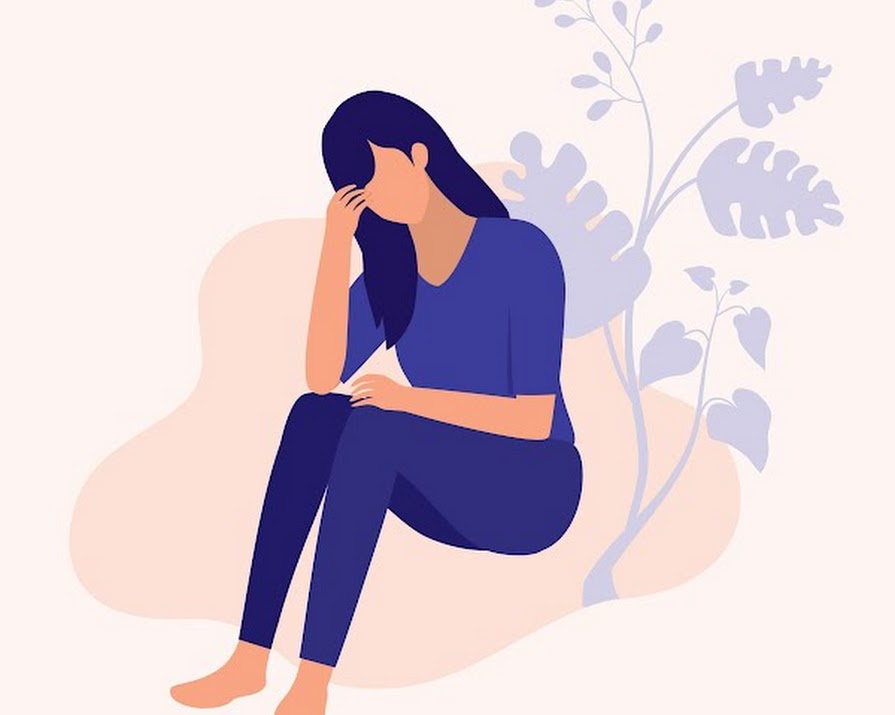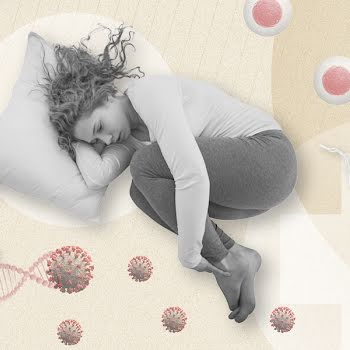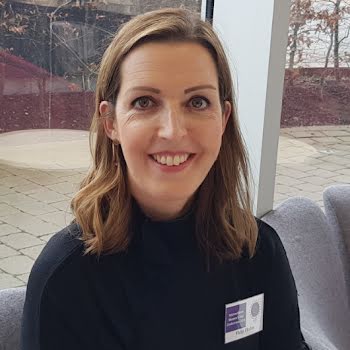
I’m 29 – no sign of any babies, but I do have cervical health concerns
By Jordan Lillis
14th Nov 2023
14th Nov 2023
The first time I got a smear, I was at an age where pregnancy was probably the scariest gynaecological diagnosis I could imagine receiving.
That might sound ridiculous, but at 25 when I received my first letter from the HSE prompting me to book an appointment, I wasn’t exactly weighed down with money, security or any sense of real responsibility. I had just gone through a lengthy breakup, so my most agonising decision at that point in life was whether to buy the cheaper bottle of red on special or splash out an extra fiver on something smoother that might soothe my heartache and make it all better. I always knew I wanted kids (yes I do have a notes page dedicated to baby names) but it felt as far away as moon travel. No money, no partner, no home of my own and no sign of an exciting income does not a baby’s home make. It was on the long list.
As a young Irish woman, you deal with smears much like you dealt with the arrival of your period or the pill years before – you go in with one eye open and do what you need to do without asking too many questions. You sort of know what’s going on – but not really. Female sexual health, as we know, is not a traditionally popular subject – not even in the classroom, from what I can remember (which isn’t much). The first time I recall cervical cancer entering my sphere of consciousness was when Jade Goody died in 2009. I was 17 and wholly ignorant about its swift power and ability to take someone so young, someone, just 10 years older than me. I was also attending an all-girls Catholic school that prioritised hourly prayers over decent sexual education, but that’s a tale for another day.
I received a normal result from my first smear, cured my broken heart with the help of potentially too much red wine and never thought about that cold little speculum again until 2018 when I, like many other women across the country, felt a rush of fear and disbelief as news hit of the cervical check scandal and Vicky Phelan’s story. I remember having resentful conversations with friends, colleagues, certain family members, along the lines of… ‘They just don’t give a shit about us, do they?’ ‘If men could get cervical cancer, you can be sure as hell this wouldn’t be happening…’ etc, etc. You know the kind. We were suitably outraged, horrified, anxious. Then, in the blink of a heavily mascaraed eye, we went back to our lives full of typing and texting, laughing and flirting, shouting above the music at gigs, agonising over Tinder dates, cursing ourselves for drinking that last pint we hadn’t needed the night before. The bigger stuff is always too frightening to ruminate on 24/7 (hello climate change) and it’s not how we’re built. Certain things do sneak their way in though, latching on like limpets and becoming a part of your own personal soundtrack of white noise, humming in the back of your head like a relentless radio station.
The timing of the cervical scandal felt very, ‘Christ, really? This too?’ as the country shuddered from the revelations of Catherine Corless regarding the ‘Lost Children Of Tuam’. Collective feelings ranged from frustration and sadness to disgust and hopelessness, to guilt, relief and back again to sadness. This of course had nothing to do with routine cervical checks, but there’s certainly a connection to be made via the seemingly blatant disregard for Irish women, their bodies and their wellbeing. I remember feeling a strange hybrid of hopelessness and heartache in relation to the two news items. I couldn’t help but feel attached, my body almost travelling through a diet version of the stages of grief for women who could’ve been my mother, aunty, grandmother, great-grandmother.
And yet again, I returned to my relatively painless, blessed yet vigorously tossed up-in-the-air life. This time I was making fretted decisions over whether I should still be living with my parents a year after lockdown or if it was time to get back on the dirty wheel of renting. Should I stay out west? Should I head back to Dublin? Should I venture further afield? While I tried my best to sift through Masters deadlines and work commitments, I received a letter one day detailing the findings of my second smear test, which included HPV and some ‘abnormal’ cells. I’d been given a date to go into the hospital in Galway for a colposcopy… my new word for the day. Over the next week or so, I would explain the situation to my friends, each time mistakenly saying colonoscopy. A whole different kettle of fish. The colposcopy would determine the level of abnormal cells, which would in turn determine further treatment I would need, if any. I found out the hospital appointment would be over quickly, and that the nurse was going to perform a similar procedure to a smear. It would just be a little more intimate, a little more intense.
I couldn’t help feel a little panicked. Then I thought, shit – do I have to tell the guy I’d been sleeping with a few months prior that I had HPV?! It’s technically an STI, although most people will be infected with it within their lifetime. We’d had a short fling during the height of dark winter’s lockdown and it hadn’t ended ideally, leaving me cursing the Gods of Tinder once again. The thought of reaching out didn’t fill me with joy. The HSE website says: “Anyone who is sexually active can get HPV, even if you have had sex with only one person. You can also develop symptoms years after you have sex with someone who is infected. This makes it hard to know when you first became infected. You may also have no signs or symptoms.”
Receiving a diagnosis of abnormal cells was the first time I had been given any kind of an indication all wasn’t, eh, well down there. My brain developed a trampoline as thoughts began jumping in all sorts of irrelevant directions. ‘But I’m healthy!’ ‘I exercise!’ ‘I eat well!’ ‘I take care of myself!’ ‘I only have the odd smoke when I’m out… that’s it!’ (Smoking decreases your body’s ability to mount an immune response, so women who smoke will have a higher rate of cervical cancer. If you smoke and your brain ever tries to justify the fact that you don’t do it that often, try and tell it to shut tf up).
The whole point of the new cervical screening test now in place is to detect HPV, as well as ‘abnormal cells’, which have the potential to turn into cancer – they might not, but they might. The idea is to keep the possibility of cancer in the area at bay instead of stumbling upon it at a later, dangerous stage. Conversations with friends always resulted in someone around the table not fully grasping my situation – ‘Wait okay, so you got your smear but they didn’t find cancer – but they need to do another test, to see if they can find cancer?’ ‘No… not necessarily… they’re just checking the level of abnormal cells,’ I’d say. ‘No mention of cancer. Anyway…’ Changing the subject made everyone feel a little more comfortable given the fact that there wasn’t much to say. Comfort came from the odd friend who’d been through exactly the same thing – they didn’t remember much about the experience other than the fact that they hadn’t been given any bad news after their colposcopies, so that was comforting (if we work on the basis that there won’t be any further errors in the cervical check system, that is… let’s not even go there). One of them told me on the phone: ‘It’s actually kind of cool. They get your cervix up on screen, so you can see everything, inside you and all. I concentrated on that and tried to forget what they were looking for.” When she said that, I pictured the safe, distant beauty of an ultrasound – a pleasantly filtered picture of your insides.
Another close friend told me on a walk to Blackrock one day that she was pregnant – herself and her long term boyfriend had finally taken the plunge and decided to go for it. ‘I can’t believe it,’ I gushed like a fool, genuinely happy as I looked at her beaming face and teeny tiny belly, putting my hand over it and feeling the hardness. We were just past Ladies Beach, and the prom was almost empty because the heavens had only just decided to stop pouring. ‘Sorry, I hope you don’t mind me telling you,’ she said, looking worried. ‘I know you’re stressed about the cervical thing.’ ‘Will you stop! It’s like the happiest distraction of all time.’ We continued on our walk, moving at snail’s pace, her patiently answering all my questions bubbling to the surface, me insisting we stop once every few feet so I could have another feel of her belly.
The day in May I went in for the colposcopy was warm, humid. I live in Galway where the wind refuses point blank to give up its seat at the table most days so I wore a hoodie thinking the layer would be light enough to fast-walk to the hospital in. I was running late (a classic move) so the sweat was pouring off me by the time I got in. Pulling on my mask, I answered some questions at reception and was then led to a room down the hall where the colposcopy would take place. The nurse was lovely, kind and warm, and she sat with me in front of a piece of paper on which she drew wobbly, makeshift examples of the different levels of abnormal cells (low grade and high grade) and told me what they meant. She was like a cherished teacher. She had a way of making the frightening seem fine, manageable, like I could take it in my stride, whatever the outcome. Today, she said, we’re just going to have a little look, and then we’ll send on the biopsy to find out for sure where your cells are at. Grand, I said. If you do end up needing to have high grade cells removed, she said, there is a minor risk to future pregnancies. We would technically be removing part of the neck of your cervix, so it means there’s higher risk of giving birth prematurely, things like that. It’s not something to worry about right now, I just have to mention it to you. Okay, I said.
Having stripped from the waist down, I awkwardly plonked myself on the long leather chair and hoisted my legs up on the leg rests as the nurse opened the door and called in an older nurse to help her out. The room smelled of disinfectant and I hadn’t eaten much that day so my tummy growled at me, annoyed. I focused on the small window above the nurse’s desk, looking out onto the carpark laying there in the heat. The two women busied themselves at my feet, as the one in charge gently spread my legs slightly wider as the little TV towering over us to my left flickered on. I tried to think of anything but the cold, poker stick-like invasion going on underneath the blue sheet draped over my legs. ‘Now, one… two… good girl, three… and we’re in, relax now for a minute, okay? Take a look up on screen there, that’s your cervix.’ I glanced up and felt an almost immediate urge to get away, to run out of the hospital with no foreign object rooting around inside me. I took a deep breath, looked straight ahead and tried not to let the flicker of the screen reel me back in. I cursed my friend for telling me to look! It was like they were live streaming a journey through Jabba the Hutt’s stomach.
Anyway, I got through it.
As I walked home from the hospital, a little uncomfortable in the large pad they’d insisted I wear in case of any spotting, I couldn’t help but think of what the nurse had said about future pregnancies. Like my 25 year old self, it wasn’t looking likely that 29 year old me was going to be considering a pregnancy anytime soon. While some of my circumstances have changed for the better, not enough have aligned yet for pregnancy to be considered the right decision at this ‘right time’. Throughout my later twenties, I’ve tried to fight off the strange and lone thought that buzzes around me like a wasp once in a while – that being single and not being one step away from parenthood is some kind of failure. Objectively I know that’s absolute crap, but on a primal level, especially when hungover, it can linger. In the event that I need treatment for abnormal cells, will it affect my future pregnancies? Will I even have any future pregnancies? Jury’s still out.
This article was originally published in August 2021.

























